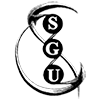Post-Acid Jazz
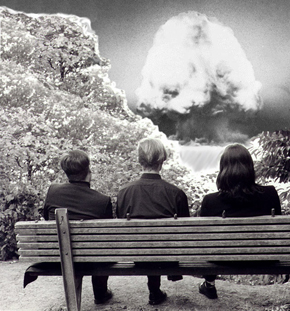 Members
Members
Rik Wright
Guitars, loops & assorted toys
Tannar Brewer
Bass
Simon Grant
Drums & samples
History
In the early summer of 1994- guitar player Rik Wright was co-writing alterna-pop music with writer/painter Nicole Friedman, (Nico7). In an effort to transform this songwriting duo into the band Spindle- Rick and Nico found drummer/producer Simon Grant. The three worked together writing and auditioning bass players. It was in this period when the trio came across bassist Tannar Brewer. Tannar didn’t really fit what Spindle was looking for- but his playing style touched a nerve in Rik and Simon that rekindled a past subject of discussion- Jazz/Rock fusion.
Eventually Spindle discovered that their musical styles and artistic goals were very hard to combine, and they disbanded.
Simon continued to work with and record Nico7, while he separately continued to work with Rik Wright and new friend/bassist Tannar Brewer under the guise of “Psychovamp”. This new threesome began working on a hard rock – jazz fusion; the goal being to combine elements of exploratory jazz composition and rhythm with hard-edged, heavy chord progressions and high energy. Many variations of Psychovamp were tested with two resultant, (and rare), self-released cassettes as a test product- VW Starship, and Atomic Jazz for the 90’s.
Response to this new material was very positive, but Psychovamp began to find that they weren’t easily able to schedule performances. As many fusion artists have found throughout history- classic jazz purists have little tolerance for too much fusion, while many rock enthusiasts tend to cling to their genre’ of choice rather dutifully as well- thus booking agents couldn’t make the space for this “too-new/too-much” fusion. It was time for a reengineering of Psychovamp’s musical approach.
The new sound was much closer to standard jazz, but the compositions were based primarily in swing rhythms to achieve that sought-for drive rather than the trendier exploratory be-bop rhythms. Instrumentation also contributed to the fusion as Rik played a hard body Stratocaster-style guitar vice the jazz standard hollow body guitar. This guitar sound had a harder edge and far more bite. The same approach was applied by Tannar with his electric bass; eliminating that standard ambient, acoustic sound of the big resonant upright basses usually found in classic jazz.
The compositional approach was simple- play the head, let someone take 24 or 32 measures for a solo, then bridge into a head out. Songs were to be no longer than six minutes. The goal was also simple- “get people who normally listened to rock-n-roll to discover the beauty of jazz exploration”. By creating compositions with almost formula-defined heads, time limited solo explorations, and overall rhythm limits- the trio had created a style that attracted listeners who possessed attention spans normally limited to four minute rock songs. By building this bridge, many rock enthusiasts discovered artists they’d never heard of like Miles Davis, John Coltrane, and Thelonius Monk.
So it was with this redesigned sound, and a full schedule of performances that the trio branded themselves: The Jackhammer Trio.
The Jackhammer Trio performed extensively from February through September of 1995. After a knockout performance at the Northwest’s renowned Bumbershoot Music Festival- the trio took a three year vacation. The band regrouped in 1998 and they performed in small tours and club dates through 2003. Each time they re-surfaced their sound had morphed into something new and updated; a sound that hinted what the players had been up to in their many other musical collaboration.
Since 2003, Jackhammer Trio has been on indefinite hiatus.
Recordings
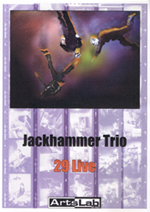 29 Live
29 Live
Jackhammer Trio
Catalog: ALI08-005
UPC: N/A, Performance Archive
© 2007, Arts Lab, Inc.
More info coming soon
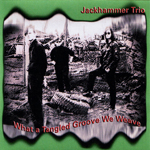 What a Tangled Groove We Weave
What a Tangled Groove We Weave
Jackhammer Trio
Catalog: SGU05-032
UPC: N/A, Limited Edition Release
© 2005, Simon Grant Unltd.
More info coming soon
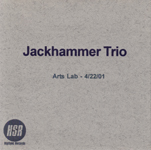 Arts Lab, 4/22/01
Arts Lab, 4/22/01
Jackhammer Trio
Catalog: HSG01-010
UPC: N/A, Limited Edition Release
© 2001, Hipsync Records
More info coming soon
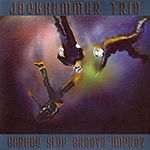 Garage Slop Groove Improv
Garage Slop Groove Improv
Jackhammer Trio
Catalog: HSG99-027
UPC: N/A, Limited Edition Release
© 1999, Simon Grant Unltd.
More info…
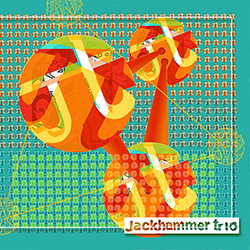 Sonarchy & Synergy
Sonarchy & Synergy
Jackhammer Trio
Catalog: HSG99-026
UPC: 686733992623
© 1999, Hipsync Records
More info…
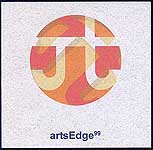 artsEdge ’99
artsEdge ’99
Jackhammer Trio
Catalog: HSG99-021
UPC: N/A, Limited Edition Release
© 1999, Hipsync Records
More info coming soon
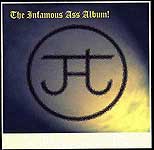 The Infamous Ass Album
The Infamous Ass Album
Jackhammer Trio
Catalog: HSG99-019
UPC: N/A, Limited Edition Release
© 1999, Hipsync Records
More info coming soon
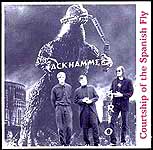 Courtship of the Spanish Fly
Courtship of the Spanish Fly
Jackhammer Trio
Catalog: HSG99-011
UPC: N/A, Limited Edition Release
© 1999, Hipsync Records
More info coming soon
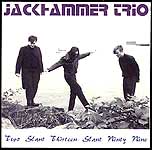 Two Slant Thirteen Slant Ninty Nine
Two Slant Thirteen Slant Ninty Nine
Jackhammer Trio
Catalog: HSG99-007
UPC: N/A, Limited Edition Release
© 1999, Hipsync Records
More info coming soon
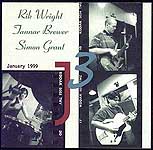 J3, January 1999
J3, January 1999
Jackhammer Trio
Catalog: HSG99-004
UPC: N/A, Limited Edition Release
© 1999, Hipsync Records
More info coming soon
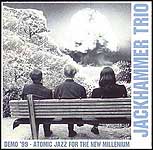 Demo ’99 – Atomic Jazz for the New Millenium
Demo ’99 – Atomic Jazz for the New Millenium
Jackhammer Trio
Catalog: HSG99-001
UPC: N/A, Demo
© 1999, Hipsync Records
More info coming soon
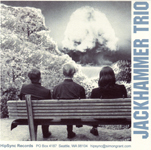 Complete Vagrant Sessions
Complete Vagrant Sessions
Jackhammer Trio
Catalog: HSG98-002
UPC: N/A, Session Archive
© 1998, Hipsync Records
More info coming soon
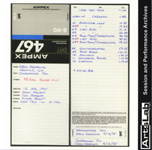 Complete Crow Sessions
Complete Crow Sessions
Jackhammer Trio
Catalog: ALI11-0519A
UPC: N/A, Session Archive
© 1995, Simon Grant Unltd.
More info coming soon
Press
Sonarchy & Synergy
Tourdates.com, July 2000
Originally recorded in August, 1999 for KCMU’s (90.3FM) Sonarchy Radio Program, the Jackhammer Trio’s Sonarchy and Synergy was later remixed and remastered. The result is a flawlessly produced album engendered in the true spirit of jazz: live and improvised.
Released on Seattle’s HipSync Records, Sonarchy and Synergy is the album to deliver experimental jazz from its perpetual misunderstanding. Traditional jazz elements merge with instruments of standard rock, creating a sound that is at once innovative and classic.
The Jackhammer Trio (Rik Wright, guitar; Tannar Brewer, bass; Simon Grant, drums) took shape in 1994. Their more mainstream-influenced music soon transformed into what they describe as “beat-oriented free jazz.” With the distortion and echo of digital technology, the guitar functions with all the rhythm of a horn section, from wail to jam. The subtle intricacies – high-hats and rim shots – of the drums are unmistakably jazz. And the bass mimics an R&B groove, a disco funk and the playfulness of an upright. The emotion stays true to the fundamental principles of jazz, something often missing in the contemporary scene.
‘Crying for Momma’ leads the album. The group gets warmed, tunes and connects with one another, and surges into an impressive five-minute set opener. Variations in speed and digital delays are the building blocks of ‘Deconstructing the Panther,’ injecting a new smoothness into Henry Mancini’s Pink Panther Theme. And in the same vein, ‘Perimeter Man’ sounds exactly like the theme music for, well, a Perimeter Man. Other standouts include ‘Legacy Flashback’ and an interesting rendition of ‘Well You Needn’t’ by Thelonius Monk, the penultimate track.
HipSync was formed in 1998 by musicians who saw a need for experimental jazz in Seattle. The website offers RealAudio samples and HipSync Radio, with which visitors can listen to streaming MP3s of the artists’ songs. Sonarchy and Synergy and some of Wright’s solo material can be purchased on the site. Along with saxophonist Dan Blunck, Wright and Grant are now in the band Disjunkt.
NOVEMBER HIGHLIGHTS – JACKHAMMER TRIO
Tourdates.com, November 2000
Next there’s Jackhammer Trio. Much more aggressive and raw in their live set, their usual mixed audience of die-hard supporters and curious neophytes watched them in action at The Rainbow on November 10. J3’s knack for jazz-style improv using traditional rock elements turned out some fantastic jams. Tannar Brewer, who’s been moonlighting in a punk rock band, has really come alive on stage. You still have time to see them on the 16th at the OK Hotel. Otherwise, you’ll have to wait for another J3 reunion – it may be a long time coming.
Seattle Weekly
November 2000
Drilling into your drums, the Jackhammer Trio spike their avant-jazz improv with a sharp slab of metal, courtesy of rawkin Rik Wright on guitar. He and bandmates Simon Grant and Tannar Brewer construct a funky, rutted, echoey texture that is well-captured on their new live CD, Sonarchy and Synergy.
Earshot Jazz
September 2000
Jackhammer Trio (guitarist Rik Wright, bassist Tannar Brewer and drummer Simon Grant) perform trippy rock, funk and hip-hop influenced improvisational musings. Their strange amalgamations of heavy metal, funk and jazz standards have evolved into beat-oriented free jazz.
Improvijazzation Nation
May 1999
Rik Wright, Tannar Brewer, Simon Grant have produced a CD that is strongly rooted in funk, lots of nice walkin’ bass, cool jazzy guitar (without th’ ‘fluff’) & drums that just won’t quit. They have a very interesting style that I want to call ‘textural experimental’, because even though they lay claim to funk, the bass is of the gentle variety, rather than straight slap all the time! & that’s a GOOD thing, because it leaves plenty of free space for the lead guitar & drummer to move in th’ directions th’ muse leads them! Wah-wah work is a solid piece of nostalgia for me, but others may not be quite as attracted to it as I was. From a “rating” standpoint (for readers interested in purchase), this gets a MOST HIGHLY RECOMMENDED!
JACKHAMMER TRIO FUSES UNUSUAL JAZZ
The Seattle Times, July 1995
Jackhammer Trio originally backed into playing jazz, but now performs its stylish brand of hard-driving, improvisational music with the force of… well, a jackhammer.
“We didn’t intend to be a jazz band,” says drummer Simon Grant. “We were playing as a pop band and in between, we’d be practicing these jazz charts. But when we found (bassist Tannar) Brewer we decided to just start playing jazz.”
“And what we have is by definition ‘jazz’ but quite a mixture of styles musically,” says Rik Wright. “It’s not heavy enough for rock clubs and not soft enough to be slow jazz. We just call it modern jazz.”
Both Grant and Wright are long-time musicians, young in age but ancient in musical experience. Grant moved to Seattle three years ago from San Francisco, both to find a cheaper lifestyle and move his music toward jazz. Wright has been in Seattle about a year, relocating from Virginia.
“Up here you can find an audience for absolutely any type of music,” enthuses Grant. “You can play any coffee shop that’ll have you.”
“The amount of performing musicians in this town is incredible,” adds Wright. “There’s got to be thirty or forty bands gigging every night in town.”
Jackhammer Trio finds Seattle an especially friendly city toward jazz. The perception of the “Seattle sound” is usually that grunge or melodic pop, but the band is excited about what it feels is an exciting and burgeoning jazz scene.
“We find a surprising number of people in their twenties who dig it,” says Wright about local jazz.
“We get a lot of kids who show up at our shows asking for us,” adds Grant. “at an all-ages venue, it’s exciting to see people who you think wouldn’t know about jazz coming out to see us.”
Jackhammer Trio came up with its name in an attempt to describe its heavy jazz sound, music with improvisation and classic jazz elements but a metal hook as well. The music sings with the smoothness of simple rhythms, yet has a rich, heavy depth that showcases the trio’s musical finesse and experience, finesse that allows them to paint vibrant musical landscapes with every song.
“We want people to know through our name that we’re jazz, but not the sort of jazz you’d normally expect,” says Wright. “When we play, it feels like we’re on top of a hill, then we start rolling and rolling downwards.”
“This is definitely a career for us,” adds Grant. “We probably picked the worst type of music to try and make money at. But if you’re not really dedicated to this music, you won’t make it.”
“We’re really physical when we play, and really enthused about what we’re doing,” says Wright. “It’s a personal statement. It’s about somebody else getting what you’re saying without you having to talk.
